In a bold shift from traditional norms, a recruitment manager at Amazon has recently announced that job applicants should ditch the formal suit-and-tie attire and opt for something more comfortable during an interview. This is because, as a recruiter, they are more interested in what the candidate has to say, not what they are wearing.
Dressing appropriately for a job interview is subjective and very much depends on the type of industry or business the applicant is interviewing for, as traditional interview attire may be more suitable for certain industries.
Preparing for a job interview can be daunting due to the high stakes involved. In light of this, Guy Thornton, Founder of Practice Aptitude Tests, has compiled the following list of dos and don’ts when it comes to interview prep to help applicants feel as comfortable and confident as possible:
DO – research the company
Employers will expect candidates to have done their homework on the business, and not doing so definitely separates applicants apart. Researching the company prior to the interview demonstrates your interest and enthusiasm. Make sure you learn about the company’s values, culture, and goals and highlight how these align with your own personal experiences and skills during the interview to really stand out among the crowd.
DON’T – overthink your outfit
Excessively stressing about what to wear will only interfere with valuable time that could be spent preparing for more important aspects of the interview. To keep it simple, ensure you are neat, clean, and dressed appropriately for the type of company or industry you are interviewing for. Certain industries are more relaxed than others, such as IT, tech, and creative industries – and smart casual attire might be more appropriate than formal ‘suit-and-tie’.
DO – practice common interview questions
This might seem like an obvious one, but it’s surprisingly common for candidates to neglect this side of the interview prep in the hopes of just winging it on the day. Practising common interview questions that are likely to crop up on the day helps candidates build their confidence and answer the questions without hesitation. Make sure to memorise certain points you want to highlight rather than a full script, as this can be perceived as robotic rather than natural.
DON’T – neglect your social media
It’s common for employers to scope out potential candidates on social media to get a sense of their professionalism and suitability for the business. Your social media presence might mould the employer’s first impression of you and may have an influence on their hiring decision.
Ensure your social media platforms are as professional as possible, and potentially hide or remove any inappropriate content or content that might have a negative impact on the employer’s perception of you.
DO – prepare questions to ask the interviewer
Towards the end of the interview, it’s inevitable that the employer will ask whether you have any questions for them about anything to do with the job, company, or interview process.
It’s really important that you utilise this time to ask well-considered questions that demonstrate your interest in the role and business. This not only proves that you have done your homework and came well-prepared for the interview; it makes you a more memorable candidate as it will help to create a dynamic and engaging conversation.
DON’T – speak negatively about past employers
Negatively speaking about past employers during the job interview can be a big red flag for prospective hiring managers. When discussing past experiences, whether negative or positive, focus on how the experience contributes to your growth, as this positions you as a proactive and constructive applicant, which is more appealing to employers.
Joanne is the editor for Workplace Wellbeing Professional and has a keen interest in promoting the safety and wellbeing of the global workforce. After earning a bachelor's degree in English literature and media studies, she taught English in China and Vietnam for two years. Before joining Work Well Pro, Joanne worked as a marketing coordinator for luxury property, where her responsibilities included blog writing, photography, and video creation.



